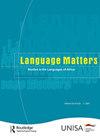Language Styles of Automotive Mechanics in Selected Garages in Dar es Salaam
IF 0.8
3区 文学
0 LANGUAGE & LINGUISTICS
引用次数: 0
Abstract
Abstract This study investigates the language styles used by automotive mechanics in Dar es Salaam to communicate mechanical information. It is guided by conceptual metaphor theory and translanguaging. Data was obtained from interviews with 20 participants, observation, and social media, specifically Jamii Forums and Facebook. The findings of the study show that automotive mechanics employ a variety of strategies to communicate messages to their clients when giving instructions, advising, explaining mechanical processes, and recommending spare parts to them. These strategies include using loan words, translanguaging, and assigning the names of body parts and human actions to car parts and mechanical processes respectively. Other strategies include the metaphorical use of body parts and personification. The study shows that automotive mechanics use these strategies not only because of their incompetence in using English or Swahili to communicate technical issues but also as a matter of style.达累斯萨拉姆选定车库的汽车机械语言风格
摘要本研究调查了达累斯萨拉姆汽车机械师在传达机械信息时使用的语言风格。它以概念隐喻理论和语言转换为指导。数据来自对20名参与者的采访、观察和社交媒体,特别是Jamii论坛和Facebook。研究结果表明,汽车机械师在向客户提供指示、建议、解释机械流程和推荐备件时,会采用各种策略向客户传达信息。这些策略包括使用外来词、转换语言,以及将身体部位和人类动作的名称分别分配给汽车部件和机械过程。其他策略包括身体部位的隐喻性使用和拟人化。研究表明,汽车机械师使用这些策略不仅是因为他们无法使用英语或斯瓦希里语来交流技术问题,而且也是一种风格问题。
本文章由计算机程序翻译,如有差异,请以英文原文为准。
求助全文
约1分钟内获得全文
求助全文
来源期刊

Language Matters
Multiple-
CiteScore
1.20
自引率
0.00%
发文量
19
期刊介绍:
The purpose of Language Matters is to provide a journal of international standing with a unique African flavour focusing on multilingualism in Africa. Although the journal contributes to the language debate on all African languages, sub-Saharan Africa and issues related to multilingualism in the southern African context are the journal’s specific domains. The journal seeks to promote the dissemination of ideas, points of view, teaching strategies and research on different aspects of African languages, providing a forum for discussion on the whole spectrum of language usage and debate in Africa. The journal endorses a multidisciplinary approach to the study of language and welcomes contributions not only from sociolinguists, psycholinguists and the like, but also from educationalists, language practitioners, computer analysts, engineers or scholars with a genuine interest in and contribution to the study of language. All contributions are critically reviewed by at least two referees. Although the general focus remains on multilingualism and related issues, one of the three issues of Language Matters published each year is a special thematic edition on Language Politics in Africa. These special issues embrace a wide spectrum of language matters of current relevance in Southern Africa.
 求助内容:
求助内容: 应助结果提醒方式:
应助结果提醒方式:


